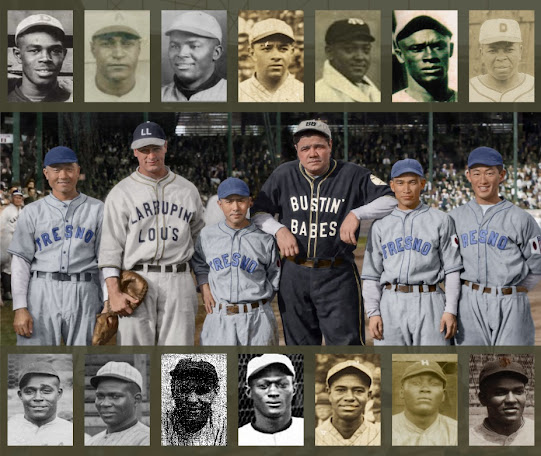The Negro Leagues Are Major Leagues. The Nikkei Leagues Are ...
... Still Ignored.
On December 16, 2020, Major League Baseball (MLB) announced that it was formally recognizing seven Negro Leagues as major leagues and adopting the statistics of the more than 3,400 players in those leagues from 1920 to 1948 into the official record. This is great news as the recognition for Negro Leagues baseball is long overdue.
What most baseball fans don't know is that many of the Negro Leaguers now considered major league caliber players, also competed head-to-head against the Nikkei (Japanese American) Leagues.
Here's a brief list of Major Negro Leagues players (featured in the above image) who competed against Nikkei Leagues teams:
- George Carr
- Joe Cade
- Andy Cooper
- Tom Dixon
- Rap Dixon
- Frank Duncan
- Pud Flournoy
- Robert Fagan
- Bill Holland
- Jesse Hubbard
- Biz Mackey
- Harold Morris
- O'Neal Pullen
- Frank Warfield
- Jesse Walker
And below is a list of the known games between the Nikkei League teams and major-league caliber players.
In that last game, Nikkei star outfielder/pitcher Johnny Nakagawa (above photo, far left next to Lou Gehrig) recorded a 5-for-5 day at the plate, with two triples and three singles against major league pitchers Bill Holland and Pud Flournoy.
Nikkei baseball historians are often asked if men like Johnny Nakagawa, Kenichi Zenimura, Fred Ishikawa and Harvey Iwata (all the players featured in the photo with Lou Gehrig and Babe Ruth) could have competed in the majors.
With the MLB announcement that 3,400 Negro Leagues players are now considered major-league caliber players, I think the evidence suggests that the answer is "Yes".
That said, I don't think all Japanese American ballplayers should be considered major-league caliber. But the same could be said for many of the pre-integration white major leaguers who by today's standards most likely would not have made it past the minor leagues.
The enduring legacy of Japanese American baseball is not reflected in the results of an old box score but in the inclusion of Asian players on major league rosters today.
Japanese Americans played a major role in building "Baseball's Bridge Across the Pacific" which opened the doors for players from all of Asia -- not just from Japan -- to compete in North America.
And it is for this legacy that Nikkei baseball pioneers like Steere Noda (Honolulu, HI), Frank Fukuda (Seattle, WA), Kenichi Zenimura (Fresno, CA), and Cappy Harada (Santa Maria, CA) -- each of them U.S. citizens -- deserve to be recognized in the National Baseball Hall of Fame for their efforts as international baseball ambassadors.
The most appropriate avenue for honoring these individuals is through the National Baseball Hall of Fame Classic Baseball Era Committee which recognizes Pre-1980 players, managers and pioneers. Unfortunately, as the rules stand today (in 2024) Japanese Americans are not eligible for inclusion in the National Baseball Hall of Fame -- only those associated with MLB and the Negro Leagues are eligible.
The Classic Baseball Era committee will meet in December 2024 to determine who will be enshrined in 2025.
That same month, sports writers will get the opportunity to cast a vote for Ichiro Suzuki, his first year on the ballot. Barring any unforeseen events, Ichiro will become the first player born in Japan to be inducted into the National Baseball Hall of Fame.
So, perhaps it's fitting that 2024 also marks the 100th anniversary of the 1924 Immigration Act (aka The Johnson-Reed Act) that banned immigration from Asia entirely (a policy revised in 1952).
Had Ichiro been born 70 years earlier (1904 vs. 1974), he would have been banned from signing a contract to play professional baseball in the U.S. (such was the case for several members of the Dai Nippon Giants in 1935).
The decades-long anti-Asian sentiment that led up to the passing of the 1924 Immigration Act is the same mindset that prevented Asian Americans from having the opportunity to compete in MLB -- and the same dynamics that led them to form their own leagues and compete against Negro Leaguers.
Unfortunately, the ripple effects of the past are still felt today. We saw it in the scapegoating that occurred during the COVID-19 pandemic, in the rise in anti-Asian hate, and in the policies created by those designated as the keepers of our nation's baseball history.
During his lifetime, Kenichi Zenimura used the game of baseball to fight bigotry and break down barriers. I suspect that his legacy will continue to do the same and eventually persuade the National Baseball Hall of Fame to modify the eligibility criteria for the Classic Baseball Era to include all people of historically marginalized baseball communities -- Negro Leaguers, Asian Americans, Latinos, Women, and religious minorities.
But, sadly, that day is not today.
##
Montage image credit: Background - Fresno Athletic Club Japanese American all-stars with Lou Gehrig and Babe Ruth, original photo Nisei Baseball Research Project, colorized version They Played in Color; Overlay: Negro Leaguers who competed against Japanese American baseball teams from Seamheads.com.

